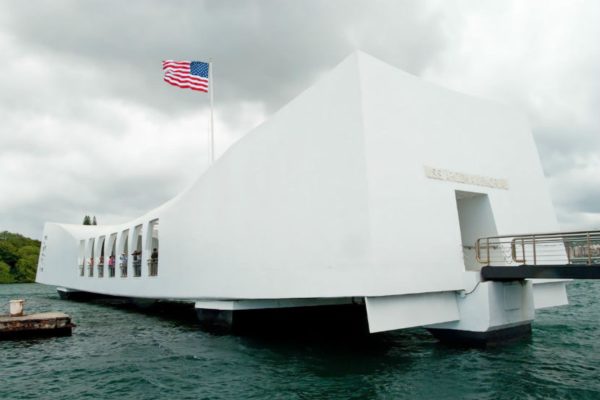As we remember and mourn Imperial Japan’s surprise attack on the American military installations at Pearl Harbor 75 years ago, we should also remember that was not just one of the bloodiest strikes on American soil.
Pearl Harbor also marked “an end to illusions,” as the theologian Reinhold Niebuhr described the United States’ sudden mindfulness of the threat posed by Japan and Nazi Germany.
Until that day of infamy, many Americans had held optimistically to certain beliefs about war and international politics that proved illusory. Such as that dictatorship and aggression in faraway lands did not concern the United States; that alliances were a source of vulnerability rather than strength; and that a strong military made war more rather than less likely.
The classic 1970 movie about Pearl Harbor “Tora! Tora! Tora!” quotes the operation’s mastermind Japanese Adm. Isoroku Yamamoto warning ominously that Japan had “awakened a sleeping giant.” Whether Yamamoto actually penned those words remains disputed, but the phrase reflected his sentiments.
In the words of historian David Kennedy, America’s “industrial base and large population would make it a formidable foe if it ever mustered the political will to fight, and probably an invincible foe if the conflict were protracted.”
And so it came to pass.
After the attack we built a globally dominant arsenal and mobilized a military that with our allies conquered Japan and Germany less than four years later.
Once awoken, the giant did not return to its slumber. Rather, the United States emerged at the end of the war as the world’s dominant superpower, with unprecedented military might and an atomic monopoly. We also assumed the mantle of global leadership and spurred the creation of the international system that still shapes the world today.
In the process, America underwent a series of diplomatic and economic revolutions: from isolationism to international leadership; from protectionism to promoting an open trading system and the institutions to manage it; and from disdaining alliances to forming an extensive network of allies, even with former enemies such as Japan and Germany.
The Pearl Harbor shock also prompted the creation of the modern American national security system. Immediately after the war, the Truman administration, mindful of the intelligence and policy failures that left us vulnerable to surprise attack, partnered with Congress to establish many of the institutions that still run our foreign and defense policy today, such as the National Security Council, the Department of Defense and the Central Intelligence Agency.
In short, as catastrophic as it was at the time, Pearl Harbor also led directly to what some called “the American Century,” our nation’s long run of global leadership that not only redefined our place in the world, it redefined the shape of the world itself.
It is something that bears remembering today.
Many Americans look at the world now with the same sense of disquiet that we did 75 years ago. In the Far East we see China’s rising power and North Korea’s nuclear weapons destabilizing the region. In Eurasia we see Russian aggression reminiscent of the Soviet Union. In the Middle East we see a region torn asunder by war. On virtually every continent we see the threat of jihadist terrorism.
Meanwhile, as a nation we feel exhausted and weary, uncertain whether we can or should continue showing international diplomatic and economic leadership. Our political leaders in both parties seem to share this sentiment.
President Barack Obama has voiced frustration towards our allies and skepticism about our own ability to influence the international stage. During the campaign, Donald Trump differed in tone but not in substance from Obama, as he also spoke disparagingly of America’s alliances and our global role.
How he will govern remains to be seen, though fortunately some of his cabinet appointments and conversations with foreign leaders indicate a renewed commitment to international leadership.
Such is one lesson of Pearl Harbor and its aftermath. Retreating behind our borders does not render us safe from threats abroad. The world is a better place, and our nation is more prosperous and secure, when the United States leads from the front. That is as true today as it was in 1941.
William Inboden is executive director of the Clements Center for National Security and an associate professor at the LBJ School of Public Affairs at The University of Texas at Austin. He previously served at the State Department and on the National Security Council staff in the George W. Bush administration.
A version of this op-ed appeared in Minneapolis Star Tribune, Omaha World Herald, Savannah World News, Scranton Times, FX Tribune, The Morning Call, The Spokesman Review, Houston Chronicle, Dallas Morning News, Fort Worth Star Telegram, San Antonio Express News, McAllen Monitor, Chippawa Herald, Austin American Statesman, Arizona Daily Star, Kitsap Sun, The Bend Bulletin, Akron Beacon Journal, Lexington Herald Ledger, Arkansas Democrat Gazette, The Syracuse Post, The Glenn Falls Post Star, Easton Star Democrat, Olean Times Herald, Helena Independent Record, Beaumont Enterprise and the Corpus Christi Caller Times.
To view more op-eds from Texas Perspectives, click here.
Like us on Facebook.




